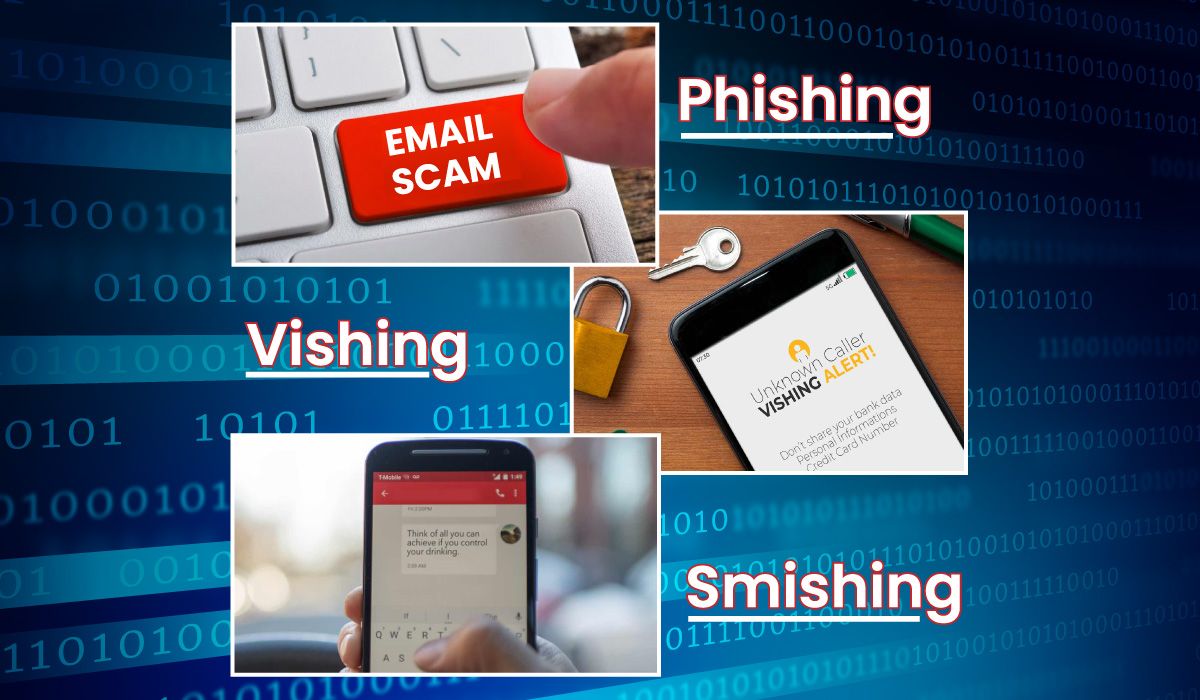Internet and Phone Security

Statewide Fraud Protection Campaign. KCB Bank encourages you to watch the short video Don’t Fall For Fake. The Kansas Bankers Association, in partnership with the Office of the State Bank Commissioner, The Office of the Kansas State Treasurer, and The American Bankers Association are currently running a statewide TV and radio campaign educating Kansans on how to identify fraudulent phone calls, text messages or email. To learn more about the fraud protection campaign, visit BanksNeverAskThat.com
As we all increasingly rely on phones and computers for our social and business interactions, fraudsters are increasing their attempts to take advantage of our connection to the world through our online presence. Security awareness is more important than ever before. One of the most common fraudulent practices is a process called “phishing” in which an email claiming to be from a reputable company or individual attempts to get you to reveal personal or financial information. In another process called “vishing” an attacker calls your phone to gain personal information. Fraudsters also employ fraud attempts through text messages called “smishing”. The frequency of phishing, vishing, and smishing attempts have all increased significantly within the past few years and will likely continue to increase and become more sophisticated.
Look-alike websites are also a problem. In this case, websites that look very similar to a site you log into will attempt to steal your login credentials during login. Some fake sites may even transfer you to the legitimate website after harvesting your login credentials.
In all these cases, it is important to be cautious with all your online activities and phone conversations particularly when dealing with someone you are unfamiliar with. The person on the other end of the email, phone, or fake website may be looking to take advantage of you.
Often times, the nefarious actor wants you to act on something immediately and may also offer you their help in taking the action immediately. It is important to stop and think about the situation before you act as there is rarely a situation where you must act immediately and only with their help. Good practice is to call the person or business back with the number or website you already have in your records to confirm the authenticity of the request. It is generally not good practice to use the website or phone number the person provides you during the interaction.
Also, emails from KCB Bank do not provide the link to your online banking website. Should you receive such an email from KCB Bank or receive a phone call from KCB Bank from a number you are not familiar with, please reach out to us at 620-355-6222 (Lakin) or 620-271-9700 (Garden City).
General guidelines for avoiding scams:
- Never provide personal information to anyone if they originated the request rather than you.
- Do not respond to emails requesting personal information.
- Always use a secure website if submitting personal information online.
- Be cautious of any email or phone call prompting you to act immediately.
- Never click on any link within an email if the sender seems the least bit suspicious to you.
- If a suspicious email comes from your bank, notify the bank with the contact information you previously have for it. Do not notify the bank with any contact information provided in the suspicious email, text, or suspicious phone number originating from your caller ID.
- Monitor your credit report
- Ensure your computer’s security, software and browser are patched up to date.
If you believe you are a victim of a scam contact the following institutions for advice and mitigation:
- Contact your financial institution
- Contact one of the three credit bureaus and request a free copy of your credit report.
- TransUnion, 1-800-680-7289
- Equifax: 1-800-525-6285
- Experian, 1-888-397-3742
- Online: Annual Credit Report.com – http://www.annualcreditreport.com
- Contact Social Security Administration, www.ssa.gov or 1-800-772-1213
Below are links to various government entities with public information on the most common cyber-related crimes and how you can protect yourself and report an incident.
Federal Deposit Insurance Corporation (FDIC): Consumer Assistance Topics - Cybersecurity
Federal Trade Commission (FTC):
Email Phishing Scams: How to Recognize and Avoid Phishing Scams
Phone Vishing Scams: Phone Scams | Consumer Advice (ftc.gov)
Text Message Smishing Scams: How to Recognize and Report Spam Text Messages
Fraud Reporting: ReportFraud.ftc.gov
Federal Trade Commission (FTC): Scams | Consumer Advice (ftc.gov)
Federal Communications Commission (FCC) Smishing Scams: Avoid the Temptation of Smishing Scams
